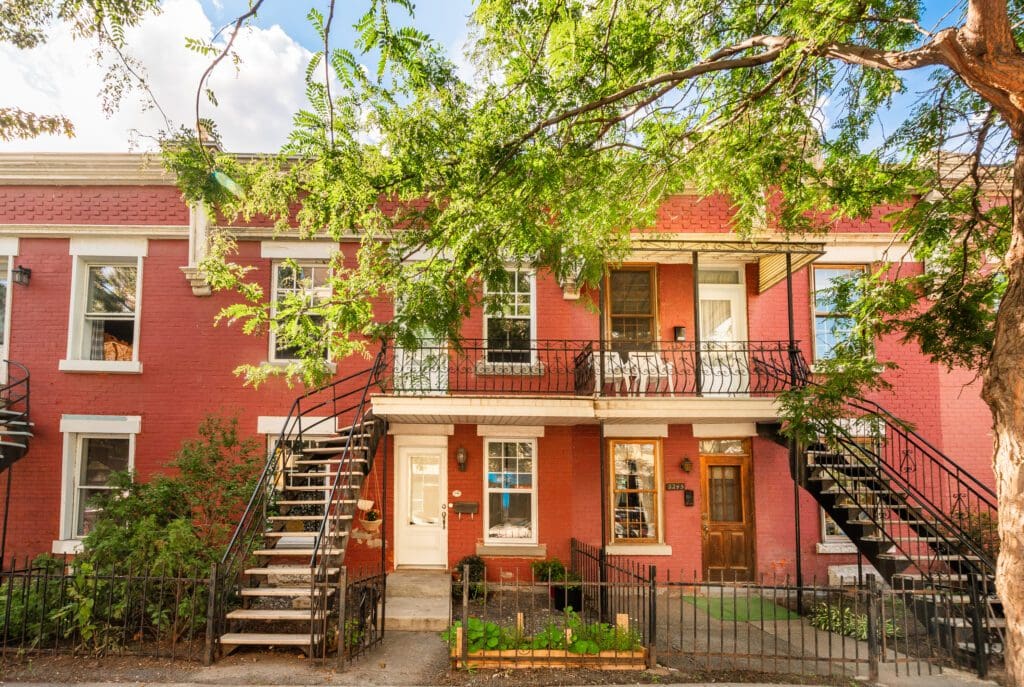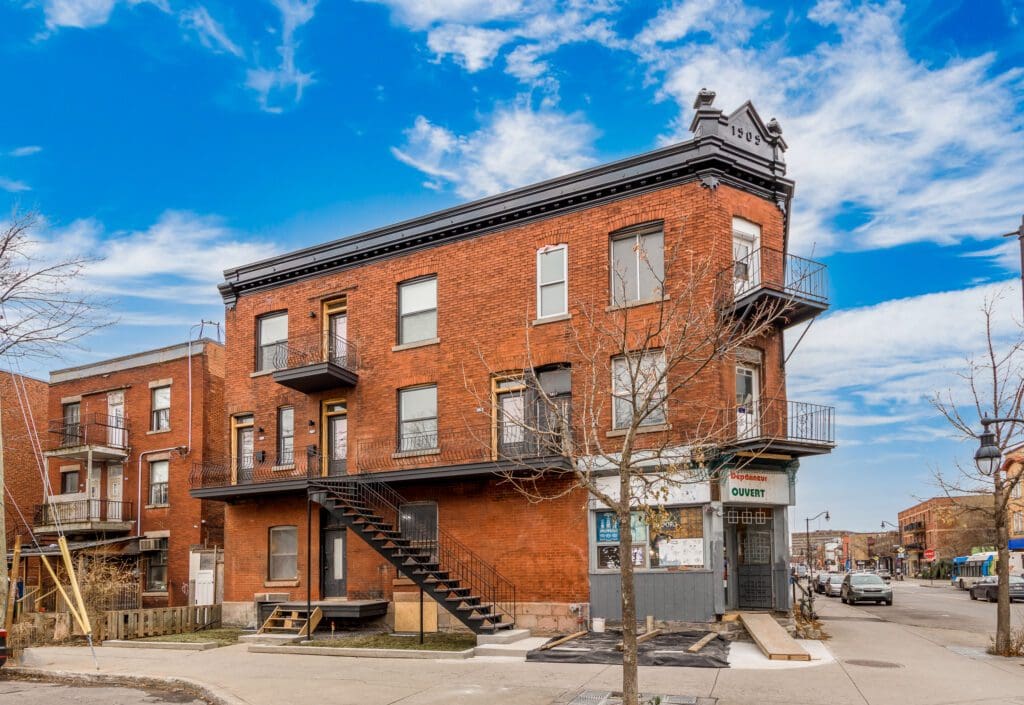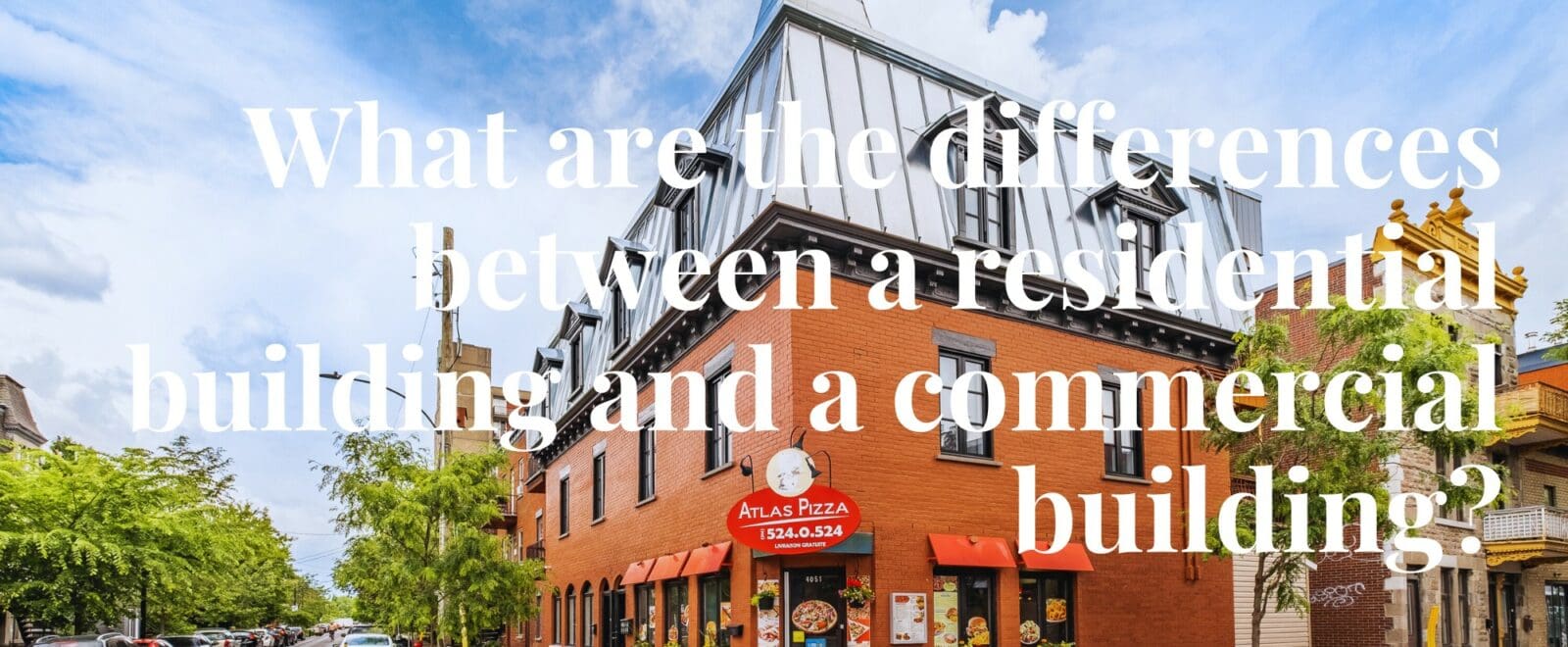Differences between a residential building and a commercial building- Key Information
What is a residential building?
It is a space where individuals and families live and reside. Residential real estate pertains to properties used for housing purposes. Single-family homes, apartments, condos, and apartment buildings with four units or fewer are considered residential buildings.

Owners of residential real estate can be individuals, real estate investors, or companies specializing in the residential sector. For the purpose of renting the property, the landlord must fill out the mandatory lease from the Tribunal administratif du logement. In residential real estate, the lease is typically of shorter duration, usually ranging from six to 12 months. When acquiring a used residential real estate property (not considered new), the transaction is exempt from GST (Goods and Services Tax) and QST (Quebec Sales Tax).
What is a commercial building?

It is a space designed to house commercial, industrial, office, or retail activities. Commercial real estate pertains to properties used for commercial or professional purposes. A building is considered commercial when it has five or more residential units. A mixed-use building is also considered commercial. It features a structure where the lower levels are intended for businesses or offices, while the upper floors can be configured as apartments or residential units. Offices, shopping malls, warehouses, hotels, restaurants, and industrial complexes are examples of commercial buildings.
Owners of commercial real estate can be institutional investors, businesses, real estate developers, or individuals. When purchasing a commercial property, GST (Goods and Services Tax) and QST (Quebec Sales Tax) apply to the portion representing the percentage used for commercial purposes. Commercial real estate is often leased to businesses or commercial tenants, which can generate higher income compared to residential real estate.
Commercial leases
Commercial leases typically have longer terms and specific conditions. Some leases can have a duration of five to ten years. Moreover, in the commercial sector, it is not mandatory to use leases from the Tribunal administratif du logement, as is the case in residential real estate.
Different rules apply to commercial leases. For instance, the owner of a commercial property can request a security deposit from the tenant, which is not allowed in residential leases. They can also prohibit subleasing or the termination of the lease by the tenant. At the end of the lease, the tenant must vacate the commercial space, whereas in residential real estate, the lease is automatically renewed. Additionally, in case of a dispute, the owner and the tenant must go to the Superior Court or the Court of Quebec, rather than the Tribunal administratif du logement as is the case in residential real estate.
Different terms are used to refer to what landlords and tenants must pay in a commercial lease:
-Gross lease: This is a lease where everything is included. The tenant only has to pay their rent. Costs related to the property are included in the rent or paid by the landlord. Charges included in a gross lease may encompass utilities (such as water, electricity, and heating), maintenance of common areas, property taxes, basic insurance costs, and similar expenses. However, it’s important to note that how these charges are apportioned between the tenant and the landlord can vary from one gross lease to another.
-Triple Net Lease (Net, Net, Net): In a triple net lease, the tenant is responsible for paying, in addition to their base rent, the expenses related to the property (cleaning, electricity, municipal or school taxes, etc.). In a triple net lease, the tenant assumes the responsibility of paying not only the base rent but also all operating expenses of the property, including property taxes, insurance premiums, and maintenance costs.
Key differences between a residential building and a commercial building
The main distinctions between residential and commercial real estate lie in the use of the properties. Residential buildings are intended for habitation and living, whereas commercial buildings are designed to house businesses and economic activities. They encompass different types of properties. A residential building can be a single-family home, while a commercial building can be a hotel, for example. The type of lease and the lease duration will also be different. A commercial lease will typically have a longer duration than a residential lease and is not bound by the mandatory model provided by the Tribunal administratif du logement. As mentioned earlier, there are many distinctions between residential and commercial leases.
Finally, the financial objectives associated with them will differ. The primary objective of residential real estate is generally to provide a living space for its occupants. While some individuals may invest in residential properties for rental purposes, the priority is often the quality of life for the residents rather than income generation. On the other hand, the primary goal of commercial buildings is to generate income from the economic activities they house. Commercial property owners can generate income in the form of rent and may also benefit from the appreciation of real estate values based on business performance.
Catalina Camacho, residential and commercial real estate broker, answers this question
Questions about the subject? Contact a real estate broker
Read more real estate articles

Réformes hypothécaires : vers un accès facilité à la propriété pour les Canadiens
Dès le 15 décembre prochain, il sera plus accessible pour la population canadienne d’acquérir une propriété grâce à deux nouvelles réformes mises en œuvre par

Leasing your property with a real estate broker
Leasing your proprety with a real estate broker – Key Information Residential renting is a common practice in Montreal, both among tenants and landlords. In

Real estate overbidding: how much should a buyer offer for a property?
How much a buyer should offer to purchase a proprety – Key Information Real estate overbidding: how much should a buyer offer for a property?



